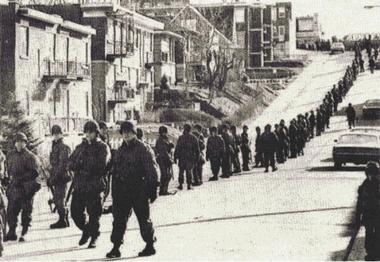
October Crisis
The October Crisis (French: Crise d'Octobre) was a chain of political events in Canada that started in October 1970 when members of the Front de libération du Québec (FLQ) kidnapped the provincial Labour Minister Pierre Laporte and British diplomat James Cross from his Montreal residence. These events saw the Prime Minister Pierre Trudeau invoking the War Measures Act for the first time in Canadian history during peacetime.
This article is about the 1970 event in Canada. For other uses, see October Crisis (disambiguation).
The premier of Quebec, Robert Bourassa, and the mayor of Montreal, Jean Drapeau, supported Trudeau's invocation of the War Measures Act, which limited civil liberties and granted the police far-reaching powers, allowing them to arrest and detain 497 people. The Government of Quebec also requested military aid to support the civil authorities, with Canadian Forces being deployed throughout Quebec.
Although negotiations led to Cross's release, Laporte was murdered by the kidnappers. The crisis affected the province of Quebec, especially the metropolitan area of Montreal, and ended on December 28.
At the time opinion polls in Quebec and throughout Canada showed widespread support for the usage of the War Measures Act. The response was criticized by prominent politicians such as René Lévesque and Tommy Douglas.
After the crisis, movements that pushed for electoral votes as a means to attain autonomy and independence grew stronger. At the time, support also grew for the sovereignist political party known as the Parti Québécois, which formed the provincial government in 1976.
Background[edit]
From 1963 to 1970, the Quebec nationalist group Front de libération du Québec detonated over 200 bombs.[2] While mailboxes, particularly in the affluent and predominantly Anglophone city of Westmount, were common targets, the largest single bombing occurred at the Montreal Stock Exchange on February 13, 1969, which caused extensive damage and injured 27 people. Other targets included Montreal City Hall, Royal Canadian Mounted Police, the T. Eaton Company department store,[3] armed forces recruiting offices, railway tracks, statues,[4][5] and army installations. In a strategic move, FLQ members stole several tons of dynamite from military and industrial sites. Financed by bank robberies, they also threatened, via their official communication organ La Cognée,[6] that more attacks were to come.
On July 24, 1967, the nationalist cause received support from French President Charles de Gaulle who, standing on a balcony in Montreal, shouted "Vive le Québec libre". De Gaulle was promptly rebuked by Canadian Prime Minister Lester Pearson. In a statement delivered to the French embassy Pearson declared, "The people of Canada are free. Every province in Canada is free. Canadians do not need to be liberated. Indeed, many thousands of Canadians gave their lives in two world wars in the liberation of France and other European countries."[7]
By 1970, 23 members of the FLQ were in prison, including four convicted of murder. On February 26, 1970, two men in a panel truck, including Jacques Lanctôt, were arrested in Montreal when they were found with a sawed-off shotgun and a communiqué announcing the kidnapping of the Israeli consul. In June, police raided a home in the small community of Prévost, located north of Montreal in the Laurentian Mountains, and found firearms, ammunition, 140 kilograms (300 lb) of dynamite, detonators, and the draft of a ransom note to be used in the kidnapping of the United States consul.[8]